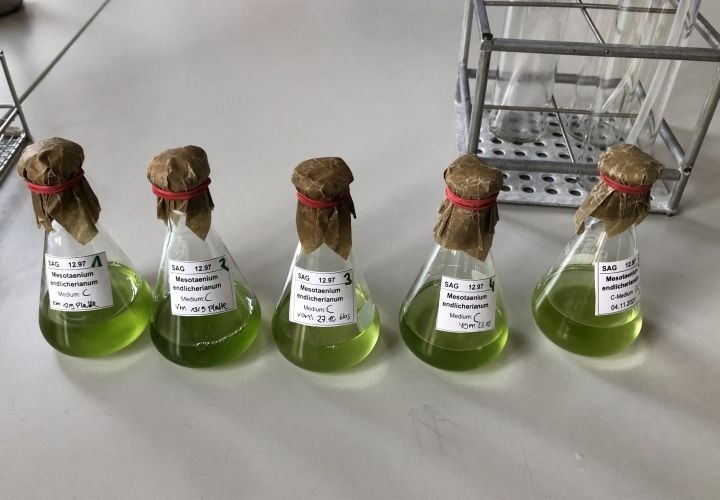Plants cover the whole surface of the Earth. They represent the vast bulk of biomass on land and are incredibly diverse, ranging from mosses to trees. Plant terrestrialization, an evolutionary event that only occurred once, is the cause of this incredible variety. During this time, it is thought that a particular kind of algae, whose modern offspring can still be studied in the lab, developed into plants and began to colonize land all over the planet.
 Liquid samples of Mesotaenium endlicherianum in a laboratory flask, which are about to be combined with fresh medium under sterile conditions. Image Credit: Janine Fürst-Jansen
Liquid samples of Mesotaenium endlicherianum in a laboratory flask, which are about to be combined with fresh medium under sterile conditions. Image Credit: Janine Fürst-Jansen
Large-scale gene expression data were generated by an international team of researchers, led by a team from the University of Göttingen, to examine the molecular networks that function in Mesotaenium endlicherianum, a common single-celled alga that is among the closest living relatives of land plants. Nature Plants reported their findings.
Mesotaenium endlicherianum was subjected to a continuous range of various light intensities and temperatures by the researchers using a strain that had been safely stored in the Algal Culture Collection at Göttingen University (SAG) for over 25 years.
Our study began by examining the limits of the alga’s resilience—to both light and temperature. We subjected it to a wide temperature range from 8 °C to 29 °C. We were intrigued when we observed the interplay between a broad temperature and light tolerance based on our in-depth physiological analysis.”
Janine Fürst-Jansen, Researcher, University of Göttingen
The researchers studied how algae respond not just morphologically and physiologically, but also by reading the information from around 10 billion RNA fragments. The researchers employed network analysis to explore the common behavior of over 20,000 genes at the same time. These similar patterns revealed “hub genes” that play a critical role in coordinating gene expression in response to numerous environmental inputs.
This technique not only provided vital insights into how algal gene expression is controlled in response to varied situations but also how these mechanisms are shared by both land plants and their algal cousins when paired with evolutionary studies.
What is so unique about the study is that our network analysis can point to entire toolboxes of genetic mechanisms that were not known to operate in these algae. And when we look at these genetic toolboxes, we find that they are shared across more than 600 million years of plant and algal evolution!”
Jan de Vries, Professor, Faculty of Biology and Psychology, University of Göttingen
Armin Dadras, a Ph.D. student at the University of Göttingen, added, “Our analysis allows us to identify which genes collaborate in various plants and algae. It is like discovering which musical notes consistently harmonize in different songs. This insight helps us uncover long-term evolutionary patterns and reveals how certain essential genetic ‘notes’ have remained consistent across a wide range of plant species, much like timeless melodies that resonate across different music genres.”
Source:
Journal reference:
Dadras, A., et al. (2023). Environmental gradients reveal stress hubs pre-dating plant terrestrialization. Nature Plants. doi.org/10.1038/s41477-023-01491-0.